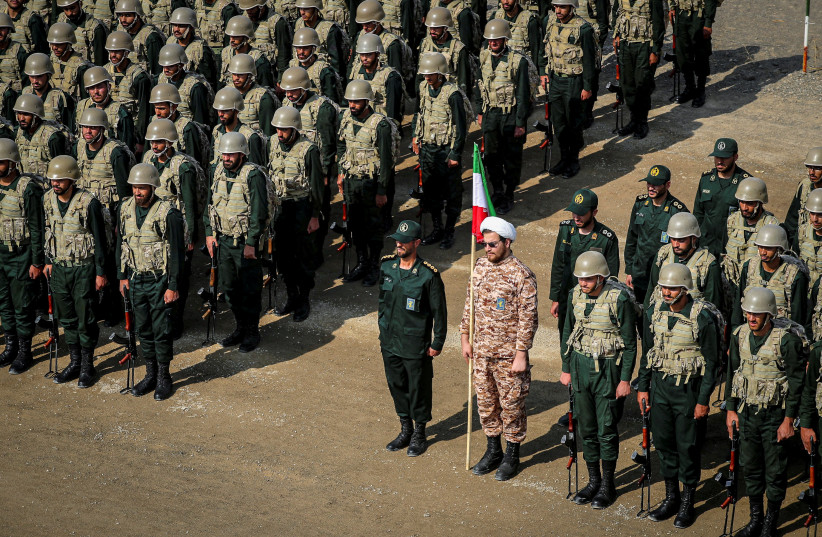A few years ago, Iranian diplomats received the red carpet in some places in Europe. Javad Zarif, the former foreign minister of Iran, boasted that he and other Iranians were “all IRGC” (Islamic Revolutionary Guard Corps). Zarif used to be greeted with smiles by some European Union officials, such as Federica Mogherini.
When former Iranian president Hassan Rouhani flew to Italy in 2016, a museum covered up artwork and statues to be subservient to the demands of the regime and not “offend” the theocrat.
Today, the winds of change are blowing. Many of them, which once swept away colonialism, are sweeping away the adoring looks and smiles that once greeted Iran’s officials. The EU is preparing even more sanctions on Iran over suppression of protests, and the European Parliament and European Commission have spoken out against the IRGC, threatening to label it a terrorist organization. The EU is angry about the IRGC’s role in suppressing protesters and sending drones to Russia.
It must be strange to think back to those days, when Zarif would go to Europe and be greeted as if he was a welcomed world leader. The “we are all IRGC” top diplomat used to bask in the limelight. He would tour and go to speak at think tanks and even spread homophobic comments and brag about his regime.
Back then, even Iran’s antisemitic extremist leader Mahmud Ahmadinejad would get invites to Western universities, such as Columbia. It was a strange time when Iran’s regime seemed to be the most valued regime in the West. Op-eds would appear, explaining how the far-right regime and its “fatwas” were actually badly translated, and we were supposed to think that Iran’s genocidal threats were legitimate “resistance.”

Those were the days back in 2009, when the West would be worried even to express any support for Iran’s protests.
What has changed?
Now, it has all changed. Iran’s regime sending drones to Russia, massacring protesters and executing innocent people is receiving a lot more spotlight. Several years ago, it would have been difficult to argue that the IRGC or Hezbollah should be blacklisted. Analysts would argue that this could empower hardliners, or that Hezbollah was a “political party,” and only its “armed wing” should be sanctioned.
Iran’s regime is both surprised and angry at this. As recently as a few years ago, Iran felt the West was divided because it was often able to tap into European concerns over former US president Donald Trump’s policies. Zarif was one of the key operators behind pushing a narrative that would often seek to tap into attempts to mock Trump or tie his policies to Israel. He tried to channel anti-Israel views, asserting that the West only had tensions with Iran due to Israel.
Today, that argument doesn’t work because Iran has openly shown its hand in how it sends drones to Russia and is involved in a long list of crimes, such as attempted assassinations of dissidents in Europe and elsewhere.
Iranian Interior Minister Ahmad Vahidi has slammed the EU for taking up the case of the IRGC.
“Some in the West want to do something outside the international rules and describe an official force [the IRGC] as terrorist, and this shows their intellectual, moral and political weakness,” he told reporters this week.
Is using the anti-Israel card still working?
Iran’s regime members are still trying to use the anti-Israel card to slow down any new sanctions and terrorist listings. Iranian lawmaker “Mohammad Esmail Kowsari, himself a former IRGC commander, said Wednesday that Europe might not be able to withstand the consequences of such a move,” Iran International reported. “‘EU officials know that this conspiracy was designed upon the instigation of the US and the Zionist regime [Israel] and has no logic,’ he claimed.”
It appears that the shift in the view of Iran across Europe will have long-term implications. In 2017, a Swedish trade delegation, made up mostly of women, went to Iran and met president Rouhani. They all covered their hair in hijabs to show respect for the regime’s forced head covering for women.
Today, when Iranians who are protesting are being murdered by the regime, it appears most European countries are less keen to respect Iran. In only a few short years, a tectonic shift has taken place: No longer will statues be covered up, or Iranian diplomats be greeted with smiles by top EU officials; no longer will some states express pride in putting on a head covering to meet Iranian officials, while protesters are killed in the streets for not wearing a head covering.
It’s not clear what tipped the balance, whether it was the supply of drones and the realization of the Iranian threat, or a combination of factors. What is clear is that Iran’s regime talking points of “the Zionists are behind this” is failing to make inroads. No longer do op-eds appear about the “moderates” in Tehran or the need to “engage” and understand that the IRGC is also a political party, or similar kinds of illogical assertions.
It remains to be seen whether the current view of Iran’s regime and the IRGC will also have an impact on larger discussions about Iran’s backing of Hezbollah, the Houthis, militias in Iraq and Hamas. These terrorist groups have also worked for a long time to portray themselves as part political party, part “resistance,” even as they illegally stockpile and trade weapons and destabilize the Middle East.
A lot of the talking points Iran and its proxies used over the years, such as arguing that a massive armed terrorist army is a “political party,” may find less sympathy in the West now.
